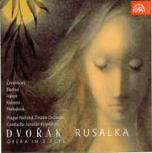I believe that this was the first Rusalka ever recorded, in 1952. The spirit of the piece is brilliantly set forth, with conductor Jaroslav Krombholc attuned to the nuances of the sometimes shimmering, sometimes big-toned score. The burst back to reality after Rusalka’s first-act “Hymn to the moon” (as it’s called) is as jarring as it should be, and Rusalka’s scenes with the witch Jezibaba are genuinely creepy. Some might balk at the cuts–I minded less the paring down of the Game-Keeper’s and Turnspit’s music and the occasional repeat than I did the excision of some of Jezibaba’s weird spell in Act 1 and her scene in the last act; altogether there are about 20 minutes of the score missing.
Be that as it may, this still isn’t the first choice among recorded Rusalkas. For one thing, the sound is too brassy, and that only adds to the somewhat trying timbres of the women in the opera. Ludmila Cervinkova has all the instincts and notes for Rusalka, but she sings effortfully; similarly, Marta Krasova’s Jezibaba is not quite the contralto called for, and she also sounds shrill. Beno Blachut’s Prince is wonderful, however, his ardency and impetuousness truly felt and his tone attractive. Eduard Haken is a potent Watersprite, giving off equal degrees of gloom and warmth. While this is a nice historical document, I’d go for the set under Neumann with Gabriela Benackova (type Q6699 in Search Reviews) or the “starrier” one, with Fleming and Heppner under Charles Mackerras.
































